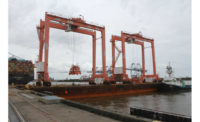The Alabama Port Authority released its February, 2022 container volumes, increasing its refrigerated cargo by 54.2% over January 2022 volumes. Intermodal rail transfers experienced a 12.4% gain over the prior month’s volumes, handling 2,898 Twenty-foot Equivalent Units (TEUs). In assessing February, 2022 containerized cargo volumes over February, 2021 volumes, containers rose 33%, refrigerated containers rose 80.9%, and rail intermodal transfers rose 148.2%.
Continued port investment through 2025 will expand the port’s container intermodal capacity in one of the nation’s fastest growth gateways. The port and port stakeholders invested $124 million in the container terminal and in refrigerated cargo facilities in 2020. New investments in intermodal and freight infrastructure will be made, thanks to millions in federal grants.
One such project is the recently announced Montgomery inland intermodal container transfer facility (ICTF). The Port Authority and CSX Transportation are investing $52 million due to record increase in intermodal rail transfers. The Montgomery ICTF will also reestablish regularly scheduled CSXT Intermodal rail service at the Port of Mobile and will provide a foundation to expand intermodal services further inland.
In addition to the Montgomery ICTF, earlier in the year, the State of Alabama announced the creation of the Alabama-USA Corridor, which is a $231.6 million program with Norfolk Southern to upgrade economic development infrastructure in central and southern Alabama.
The A-USA Corridor initiative entails a 280-mile rail corridor that will serve in-state mega sites in Etowah, Shelby and Washington/Mobile counties, warehousing, and intermodal rail service connections between Norfolk Southern’s McCalla Intermodal Facility near Birmingham and the Port Authority’s container intermodal terminal assets at Mobile.
“The Port of Mobile is rising to meet the market’s needs as demand for dynamic, on time service grows nationwide and shippers leverage optionality to increase competition,” said Beth Branch, chief commercial officer.
The optionality provided by the Port of Mobile is creating permanent shifts in shipper supply chains under the pressure of national supply chain disruptions and announced investments in regional manufacturing, processing, and retail/distribution business lines.
The Alabama State Port Authority oversees the deep-water public port facilities at the Port of Mobile. The Port Authority’s container, general cargo and bulk facilities have immediate access to two interstate systems, five Class 1 railroads, nearly 15,000 miles of inland waterways and air cargo connections.
.jpg?1648041134)
.jpg?height=200&t=1713912673&width=200)

